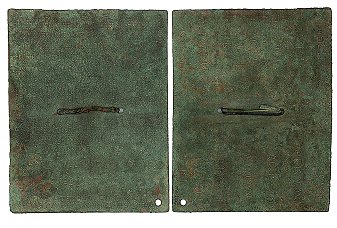|
| |
Major Acquistion:
THE ROMAN LIBRARY
| # 20
DIPLOMA ISSUED BY EMPEROR MARCUS AURELIUS
GIVEN TO THIA TIMARCHUS F. DACO, AFTER 26 YEARS OF SERVICE WITH THE
COHORT II GALLORUM VETERANA IN BRITAIN, STATIONED AT THE ROMAN FORT IN OLD PENRITH IN
CUMBRIA. 
MS in Latin on bronze, Roma, 23 March 178, 2 tabellas (complete).
Binding: Barking, Essex, 1995, blue cloth gilt folding case, by Aquarius.
Commentary: The present diploma gives Thia Timarchus an honourable discharge
from the army of Emperor Marcus Aurelius, Roman citizenship for himself and his
descendants, and the right of legal marriage. The diploma is exceptional in that the 2
tabellas still are bound together with the original wire. It is also of special British
interest since it records for the first time that the Cohort II Hispanorum was stationed
in Britain, and of historical significance for recording Ulpius Marcellus as governor of
Britain in 178. |
| # 21 LUCIUS ANNAEUS
SENECA: EPISTOLAE; COMPRISING THE SPURIOUS CORRESPONDENCE WITH ST. PAUL |
 |
| MS in Latin on vellum, Milano, Italy, ca. 1440, in a
cursive humanistic book script by 2 scribes, headings in red, 3 very large historiated
illuminated initials, 2 of them by the Master of the Vitae Imperatorum. Commentary:
The Master of the Vitae Imperatorum was one of the foremost Milanese illuminators of the
time, employed at the court of the Visconti.
The famous apocryphal correspondence with St. Paul had been a frequent companion of the
Letters from the early middle ages. |
 |
#22
DECIMUS JUNIUS JUVENALIS:
SATIRES |
| MS in Latin on vellum, Ferrara, Italy, 1453, 11 2-to 3-line
initials in burnished gold with intertwined white-vine patterns in pale brown infilled
with blue, pink, green and bright red, dotted in white and yellow, with partial or
full-length white-vine borders Commentary: The style of illumination is broadly
that of the Bible of Borso d'Este, commissioned in Ferrara in 1455, and illuminated by a
number of artists. Luxurious Renaissance MSS of this kind were the particular taste of the
princes of the courts in the Italian states. The Satires of Juvenal (ca. 60-140 AD) form a
witty ridicule of the vice and dissipation of the Roman Empire in the age of Nero,
Domitian and Trajan, and was the last of the great poetry collections of the golden period
of Roman literature. |
| The Question: Dewey felt a need to expand on Plato and Rousseau's proto-democratic
educational philosophy. (Dewey saw Plato as over-emphasizing the role of society in
the student's education and Rousseau as tilting too much towards the individual).
Essentially, Dewey believed that the individual was embedded in her society. Yet,
later he realized the importance of subjective experience in introducing revolutionary new
ideas. How can teachers balance the needs of a class with the needs of each
individual? In what ways can a teacher challenge gifted students, nurture the main
student body as well as encourage the students who need more time -- all the while finding
ways to value each person's unique way of being in the world? |
|